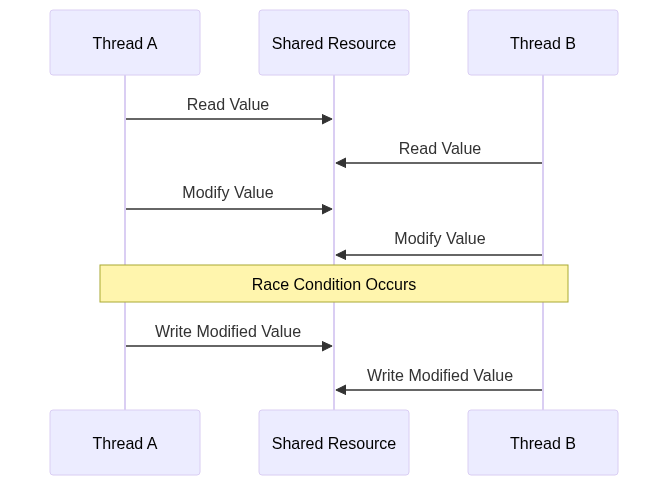Day 11: Concurrency Fundamentals - Race Conditions: A Deep Dive
Table of Contents
- Introduction to Concurrency
- What are Race Conditions?
- Types of Race Conditions
- Real-world Examples
- Detecting Race Conditions
- Prevention Strategies
- Code Examples
- Mermaid Sequence Diagram
- References and Further Reading
- Conclusion
Introduction to Concurrency
Concurrency is a fundamental concept in modern computing where multiple tasks or processes execute simultaneously. In the world of parallel and distributed systems, understanding concurrency is crucial for developing efficient and reliable software.
Key Concurrency Characteristics:
- Simultaneous execution of multiple tasks
- Shared resource management
- Complex interaction between threads or processes
- Potential for unpredictable behavior
What are Race Conditions?
A race condition occurs when the behavior of a system depends on the relative timing of events, particularly in concurrent systems. It happens when multiple threads or processes access shared resources without proper synchronization, leading to unpredictable and potentially incorrect results.
Defining Characteristics:
- Multiple threads accessing shared resources
- Lack of proper synchronization mechanisms
- Order of execution can impact final result
- Non-deterministic behavior
Types of Race Conditions
1. Read-Modify-Write Race Conditions
In this type, multiple threads read a shared variable, modify it, and write back the result, potentially overwriting each other’s modifications.
2. Check-Then-Act Race Conditions
Threads check a condition and then take an action based on that condition, which might change between the check and action.
3. Compound Race Conditions
Complex scenarios involving multiple shared resources and intricate interactions between threads.
Real-world Examples
Banking Transaction Scenario
Imagine two concurrent bank transactions attempting to withdraw money from the same account simultaneously:
- Thread A reads current balance: $1000
- Thread B reads current balance: $1000
- Thread A withdraws $500
- Thread B withdraws $600
- Incorrect final balance instead of expected $400
Ticket Booking System
Multiple users trying to book the last available ticket can lead to overbooking or inconsistent seat allocation.
Detecting Race Conditions
Detection Techniques:
- Static Code Analysis Tools
- Dynamic Race Detection Tools
- Comprehensive Testing
- Thread Sanitizers
- Stress Testing with Concurrent Workloads
Prevention Strategies
1. Mutex (Mutual Exclusion)
Use locks to ensure only one thread can access a critical section at a time.
2. Atomic Operations
Utilize atomic instructions provided by programming languages and hardware.
3. Synchronization Primitives
- Semaphores
- Condition Variables
- Read-Write Locks
Code Examples
Here’s a comprehensive C example demonstrating a race condition and its prevention:
#include <stdio.h>
#include <pthread.h>
int shared_counter = 0;
pthread_mutex_t mutex = PTHREAD_MUTEX_INITIALIZER;
// Race Condition Version
void* increment_without_mutex(void* arg) {
for (int i = 0; i < 100000; i++) {
shared_counter++; // Unsafe increment
}
return NULL;
}
// Safe Synchronized Version
void* increment_with_mutex(void* arg) {
for (int i = 0; i < 100000; i++) {
pthread_mutex_lock(&mutex);
shared_counter++; // Safe increment
pthread_mutex_unlock(&mutex);
}
return NULL;
}
int main() {
pthread_t threads[2];
// Demonstrate Race Condition
printf("Demonstrating Race Condition:\n");
shared_counter = 0;
for (int i = 0; i < 2; i++) {
pthread_create(&threads[i], NULL, increment_without_mutex, NULL);
}
for (int i = 0; i < 2; i++) {
pthread_join(threads[i], NULL);
}
printf("Final Counter (Unsafe): %d\n", shared_counter);
// Demonstrate Safe Synchronization
printf("\nDemonstrating Safe Synchronization:\n");
shared_counter = 0;
for (int i = 0; i < 2; i++) {
pthread_create(&threads[i], NULL, increment_with_mutex, NULL);
}
for (int i = 0; i < 2; i++) {
pthread_join(threads[i], NULL);
}
printf("Final Counter (Safe): %d\n", shared_counter);
return 0;
}
References and Further Reading
- “Operating Systems: Three Easy Pieces” by Remzi H. Arpaci-Demetriu
- “Art of Multiprocessor Programming” by Maurice Herlihy
- POSIX Thread Programming
- Linux Manual Pages on Pthread
Conclusion
Race conditions represent a critical challenge in concurrent programming. By understanding their nature, detection methods, and prevention strategies, developers can create more robust and reliable concurrent systems.
Key Takeaways:
- Race conditions arise from uncontrolled concurrent access to shared resources
- Proper synchronization is crucial
- Multiple strategies exist for prevention
- Continuous learning and careful design are essential
Next in Series: Day 12 will explore Mutex and Semaphores in depth.
Note: Compile the code with -pthread flag: gcc -pthread race_conditions.c -o race_conditions
